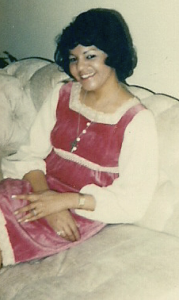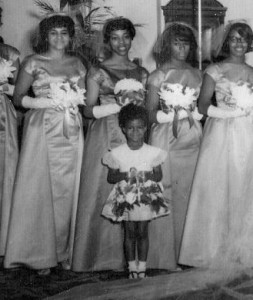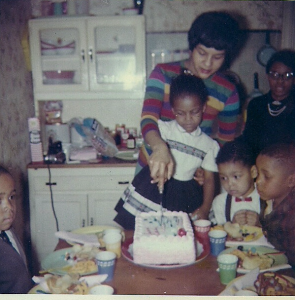
Hi Mommy,
It’s been awhile since I’ve written, although you know I’ve been talking to you every day. I have everything else in the world to think about this time of year, but my mind ventures back to 626 Pine Street in Camden – the neighborhood, our lives together there in the early 1960s. How many times did we talk and laugh about that narrow first-floor apartment with the big backyard in that rowhouse that seemed so big to me.
You know I drove down there one a day off in 1990, parked across the street and just looked at that tiny little row house. There were workmen rehabbing the building and one of them, seeing me with a nice car, professionally attired. struck up a conversation about how they were fixing things up, trying to bring the neighborhood back, and maybe I wanted to buy a nice investment property? Maybe so, I smiled. I used to live here when I was little, I volunteered. Then, you should come back and invest in the neighborhood, he said. Yes, I said, perhaps I should.
And I knew I wouldn’t. I had come back there for a glimpse of a world that no longer existed. I remember the sidewalk were I crouched and scratched at the dirt between the concrete slabs with a popsicle stick, trying to dig my way to China. I remember summer afternoons where people came out, swept and scrubbed their steps with a broom dipped in hot sudsy pine cleaner. The step-scrubbing came only after the insides of our homes had been scrubbed, dusted, and tidied to a fare-thee-well, of course. And all of that might have come on top of a day’s work, or a night shift at the Campbell soup factory.
And here in an evening, or on a Saturday afternoon, the kids would play and the adults would sit on the steps and watch us. We were especially close to the Bennetts – Cheryl and Butch were a few years older than me, but they let me tag along behind them. They had an older relative we knew as Aunt Sug, a wizened woman with ebony skin, care-worn hands and the kindest eyes. She sat in her lawn chair and regarded us with amusement. Occasionally, she’d share a clump of her Argo starch with me. (Apparently, this starch-eating phenomenon surprised and distressed Northern physicians, who believed that it contributed to anemia and folic acid deficiency in pregnant women. This 1967 Time magazine article reported:
To their astonishment, Northern doctors have lately discovered that eating laundry starch is all the rage among Negro women—especially pregnant women—in many Northern-city slums. At D.C. General Hospital, Chief Obstetrician Dr. Earnest Lowe estimates that up to one-fourth of his patients are starch addicts. At Los Angeles County Hospital, three or four patients a week are diagnosed as having anemia apparently caused by starch binges.
Read more…
Aunt Sug also dispensed discipline. Her favorite admonition was, “You better be good or I’ll shoot you!” Actually, she was always threatening to shoot me. The last time I saw her, I was leaving with Dad for the weekend and she said, “You’d better come back and see me, or I’m gonna shoot you!” Years passed before I stopped being afraid that she really would come get me for not visiting her.
The neighbors congregated around the Bennetts’ steps to play checkers, drink Coca-Cola, and talk about the issues of the day. It was there that they debated whether the 1963 March on Washington would do any good. I have a couple of distinct memories of that time. One is the day that a bunch of men with fezzes marched down our street. I don’t know why. Another was the Saturday afternoon that someone shouted out, “Colored boy on American Bandstand!” and everybody ran in the house, turned on the TV and saw:
When the song ended, we ran back outside, excited. The older kids knew all about him. “You know he blind?” “I’m gonna get that record!””What’s his name?””Little Stevie Wonder!”
I locked my car and walked down to the drugstore on the corner. That corner and that building fascinated me because both were triangle shaped:
The drug store, of course, was tiny compared to my memory. When you entered, the counter ran along the left side and the back wall, where the prescription counter stood. I remembered the two white men in white pharmacist’s jackets who worked there. There were shelves filled with merchandise in front of me. I don’t think that in the early 60s, the store had such an array of rat and roach killers: borax and Raid and those big-barreled pump-action insecticide spray guns. Rat traps. Bait. Mousetraps. I walked back to my car and looked my old house one more time.
Our apartment door was immediately on the right when you entered the house. A flight of stairs directly in front of you led to the upstairs apartment. There were also steps that went to the basement, where I occasionally went to visit toys that were stashed there, or to squash waterbugs. I don’t recall our upstairs neighbors. Open the door to our apartment and you are in a small living room. A couch is directly across from you. To the right of the couch, there’s a small bookcase that holds some volumes of children’s stories, a Bible, and a few odds and ends. A small black and white television is on the same wall as the door.
To the right of the living room area, there is the front room where you had her bedroom furniture. We slept there, except for when I slept on the couch. To the left was the kitchen, and behind that, a short hall that led to the back door. The bathroom was tucked behind the kitchen, on your left as you went out to the backyard.
I remember the routines. How I would come home from kindergarten at the Broadway School and ask for permission to have a slice of bread and butter. It was my favorite treat. How you used to wash our clothes with a big old pink old wringer washer you’d been given, warning me not to ever go near it.
How, on Saturday morning, you would dress me in my itchy crinoline, vaseline on my legs, anklet socks and patent leather shoes and we would walk to our storefront church. (I was always confused by that church, not only because we went on Saturday, but also because when you got to the front door, you would raise your hand in salute and say, “Hail!”) A woman at the door would do the same gesture, and we would go in for the service, where I was frequently pressed to sing, “Yes, Jesus Loves Me.” Other than that and the memory of you singing with the a cappella choir, I only remember that the other kids in the church were two boys. Sometimes we were allowed to leave the service and sit in the kitchen. The boys got me to play this game where we took one of the pennies we had for the collection plate, licked it, and stuck it to our forehead. I think the object was to make your penny stick the longest. It was great fun until one of the boys swallowed his penny. They made him eat a lot of bread. It took a couple of years before I realized how that was supposed to make the penny come out.
I think I was about six when the Pastor of that church, Evangelist Crowdy, died in a car accident. John Facenda announced it on the news. I didn’t tell you. I don’t think I understood what death was. Eventually, a church member told you and you came and told me. When I told you I had seen it on the news, you were shocked. “Why didn’t you tell me?” I didn’t have an answer. I do recall filing past his coffin with you. I think I touched his hand. It felt funny.
I remember the special times, too. Two moments stand out for me. There was my fifth birthday, when you threw me a party and Cousin Ralphie and I danced the Twist.
Ralphie and I did the up and down part, to the floor and back, while the adults cheered us on:
You gave me a tricycle, which was my favorite of favorite toys until I got a two-wheeler three years later. Here we are, cutting the cake as Ralphie looks on:
The other was from being the flower girl in your best friend’s wedding. I never felt so pretty as I did that day. My first time having my hair straightened and curled, so it looked more like yours.

I know. You want me to talk about the coat. How it was a blazing hot day, and we’d walked to Broadway.It was a big and busy street, then, prosperous enough that there was actually a Tiffany’s jewelry store. Not our destination, though. We went to the Goodwill. I needed clothes. While you were browsing the short sets, I saw a red ski jacket. I had to have it. You said no. I whined. You said no, again. I whined louder. This went a couple of rounds until you got frustrated and said, “Fine!” You bought the coat and insisted that I wear it home. I whined about being hot. Suddenly, you seemed to have gone deaf.
You laughed about that for years afterward.
And of course, an account of Pine Street wouldn’t be complete without a mention of the time I walked into a brick wall. It’s not as stupid as it sounds. Well, it is, but I keep in mind that i was about five. I was playing Space Monsters in the backyard with my friends. The narrow lane on the side of the house was the safe area; the backyard was where the space monsters could grab you and make you blind. We would run out, be “blinded,” and have to find our way back into the alley. That was how I walked into the wall – my eyes were closed. Mom they’re laughing. Hey, I was five. Give me a break!
I remember the gush of blood from my forehead. I remember walking into the kitchen where you were cooking. I was trailing blood on the hall floor. I remember saying, “Mommy,” and I remember your horrified face. I must have looked a bloody mess – you know how they say face wounds look worse than they are. I remember you getting a washcloth and my face turning it bloody red. Somehow, Uncle Sonny was summoned, and he carried me to the ER in his arms.
It occurs to me now that you were only about 22 when this happened, and he was even younger.
Since then, I have carried a small dent on my forehead.
Sleepytime, Mommy. I missed you at Thanksgiving. I love you very much.
Kim

